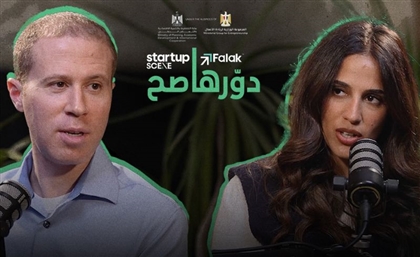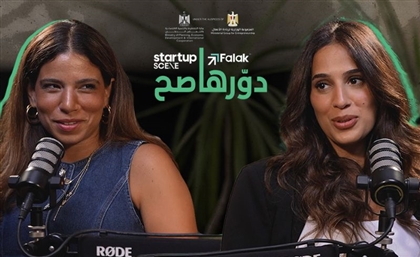What I Did Next: Malak Fouad Looks at Life’s Pivotal Moments
Seasoned storyteller, Malak Fouad, speaks to StartupScene about her philosophy and trajectory, two things she she channels in her podcast series, 'What I did Next’.

A curious, unconfined conversationalist, Malak Fouad wants to convey a different story of Egypt and the Middle East, one aligned with the transformation she has witnessed within the region over the past decade, and one which encourages listeners to give a chance for their self-determining capacities to thrive.
With a deeply entrenched well of optimism as an ever-present resource at hand, she seeks to remind us that, while the daily adversities we face are indeed an inescapable fact of reality, there remains within them a glimmer of opportunity to constantly create the world we wish to live in.
Boasting a career that spans across storytelling, whether it be in her stints at New York’s Condé Nast publication, the foreign desk of the Ahram Hebdo newspaper, or the features desk at the Daily Mail, Fouad stepped into podcasting.
In her podcast, What I Did Next, she gives guests the space to reflect on pivotal moments in their life, moments which lay the ground for defining the trajectory of their paths. In its first season, this approach has offered eclectic insight thanks to an eclectic roster of guests, including Samih Sawiris, Ahmed Alfi and Dina El Mofty, as well as the likes award-winning commercial director, Ali Ali, and mountaineer and adventurer, Omar Samra.
She presents the example of a 2005 speech by Steve Jobs, which she asks all her podcast guests to listen to, and which was delivered during a Stanford University graduation ceremony as he connected the dots of a past that determined his path. Jobs reveals how, after effectively dropping out of university, he would linger around and participate in classes unrelated to his degree.
One such class was in calligraphy, which, 20 years later, would inform the design of the revolutionary Macintosh. “It’s the reason the Mac has such attention to detail and focuses heavily on the design aspect,” she explains, “it all stemmed from that class. He wasn’t just hanging around, he was gaining an appreciation for something that he actually used much later on, almost subconsciously.”
In Fouad’s case, it was the daily commute between the dots that are her home and the American University in Cairo (AUC) as she pursued her master’s degree in the School of Global Affairs which proved to be a pivotal moment in her own evolving trajectory.
During the drive, her habit of listening to podcasts while navigating Cairo’s streets provoked her interest before she decided that this was something she wanted to do next.
“These pivotal moments,” she says with a bank of experience that adds authority to her conviction, “are not always professional, and they are not always conscious. We are always making decisions that change our life, and it’s only when you look back at them that you realise.”
Her podcast, which has consistently remained in the top ten of regional charts and, she is enthusiastic to announce, secured the sponsorship of property developer Marakez for its upcoming second season, seeks to achieve multiple objectives, not least to tell a more positive story of a changing Middle Eastern landscape.
“There’s so much negativity coming out of our region, so much bad news. It’s all doom and gloom all the time, I just couldn’t take it anymore.” Wanting to tell hopeful stories, she did not look far to find the people making the difference. “There’s tons of them,” she exclaims, “I’ve got a wish-list [of people to invite onto the podcast] and it just keeps getting longer, and longer, and longer.”
The podcast does not focus on a particular profession, industry, or even nationality. She is open to hosting not only Arabs, but foreigners living in the region or somehow connected to it. Delivered in the English language, she is seeking to speak to multinational, multi-cultured, or individuals of various heritages: those who speak several languages and whose interests are global. A main element of the selection criteria is simply that they are motivated to lead the world to a better place.
While the first season has focused more on home and largely featured Egyptian-centred guests, the second season will see its scope focus more on the wider Middle East. She has also created A&T Media as an umbrella company, under which she will run several other new podcasts.
In conversation during What I Did Next, Fouad does not come with a host of scripted questions, but rather presents two consistent questions to each guest, in order to get an insight into their personalities.
“The discussion is a sort of free flow, a meandering through their life journey, and specifically their pivots, because everyone faces moments when you’re confronted with the question of which route or path to take.”
She pinpoints that the pivotal moments in one’s life need not be spectacular, they may not even be noticed as they occur, and are often characterised by mundanity. They could be looked back on and seen as not a moment, but a series.
In Egypt, [people have realised] they’ve got to create the world they want to live in. Before that, we were very much a society in which one would have a path or job for life, and that mould has been broken.
As she delves into conversation with guests, one consistent admission present in their reflections is the recognition of the role of luck in their trajectories, “a lot of them spoke about being in the right place at the right time, it’s a big factor.”
“I wasn’t surprised because I do think luck has a big part to play,” she admits. On the success of her own podcast, she reaffirms her steadfast belief that there may be a glimmer of positivity in moments of adversity and considers how it was born amidst a pandemic, a time in which people’s habits have been changing.
“The Covid crisis made people stop and re-evaluate a little bit. People are doing different things: you might not have been a walker, but now you walk an hour a day. What are you going to do on a walk? You could listen to music, chat with a friend, or listen to a podcast. I was lucky I came in with the product at that time.”
Another resounding lesson from her guests, she reveals, and what seems to distinguish them in their accomplishments, is their contagious sense of positivity.
“Everyone faces challenges in their life: a moment when you’re having a really difficult time personally or professionally. I guess what singles out these people is how they’ve turned that around and made it work for them. Of course, it doesn’t happen overnight, but their element of positivity was really striking.”
I got a review from an Egyptian woman abroad who spoke of how happy she was to listen to What I Did Next, because it allowed her to reconnect with her country in a very positive way.
Fouad’s studies, a bachelor’s in international Relations at the University of Kent in 1995, and an MA in Global Affair at the AUC, in 2020, indicate a concern with social responsibility and public participation.
Looking back over the past decade, she sees one of the positive impacts of the Arab Spring to be a societal shift as people take the future into their own hands. “In Egypt, [people have realised] they’ve got to create the world they want to live in. Before that, we were very much a society in which one would have a path or job for life, and that mould has been broken.”
It is something that she says was not around when she was in her ‘20s. “Look at the Greek Campus, well, before corona times, it was buzzing with these great kids with amazing ideas and an enthusiasm to see if it could work.”
Ever-inspired by her late-aunt, Nadia Younes, an exceptional United Nations (UN) diplomat and civil servant whose life was cut short in 2003 in a tragic bombing while she worked in Iraq, Fouad herself commenced her career with two experiences at the UN’s New York headquarters in the mid-1990s, hoping to continue a tradition of her aunt’s achievements.
Yet, instrumental to informing her worldview, Fouad hints that Younes had been gently guiding her elsewhere from the path, warning that times were changing, and that it may not be the way to get the results one wishes to see.
For Fouad, a career storyteller whether it be in journalism or as a company strategist, podcasting has therefore become a natural progression. The beauty of podcasting, she says, is its immediacy; "you’re connecting with someone else and having a discussion.” As she brings to light stories of the Middle East that present a hopeful future for the region, she has been met with touching, enthusiastic responses from the diaspora. “I got a review from an Egyptian woman abroad who spoke of how happy she was to listen to What I Did Next, because it allowed her to reconnect with her country in a very positive way.”
The review delighted Fouad and indicated to her that her work was indeed fulfilling a sense of social responsibility through a different medium.
As we move towards the end of the conversation, I ask: if she could invite a figure from the past onto the podcast, who would it be?
“My aunt, definitely,” she replies. Beyond the importance of her accomplishments, Fouad lauds Younes as always having been the life of the party, “she was a lot of fun, she would be a fantastic dinner guest for everyone, I’d certainly bring her.”
“She died very tragically, but she died doing what she loved,” says Fouad, and while she admits it is not easy, she continues to try and find comfort by celebrating her life, achievements, and lessons.
In her ever-evolving trajectory, Fouad may find herself yet again at another moment of pivot in which she manifests a legacy taught to her by her aunt Younes.
Listen to the What I Did Next podcast here.






















